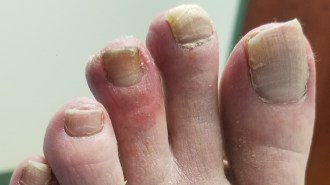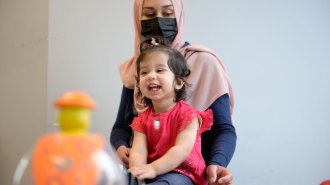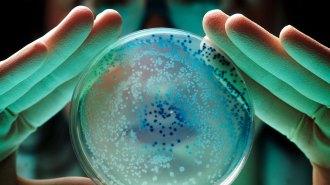Health & Medicine
-
 Health & Medicine
Health & Medicine‘Forever chemicals’ may pose a bigger risk to our health than scientists thought
PFAS are linked to obesity, cancers and more. Growing evidence of the chemicals’ risks has prompted new guidance for safe drinking water and consumer testing.
-
 Health & Medicine
Health & MedicineHow researchers are working to fill the gaps in long COVID data
Collaboration with patients and with researchers from many specialties is key to better understanding long COVID and managing its many symptoms.
-
 Health & Medicine
Health & MedicinePollution mucks up the lungs’ immune defenses over time
A study of immune tissue in the lungs reports that particulate matter buildup from air pollution may impair respiratory immunity in older adults.
-
 Health & Medicine
Health & MedicineGot a weird COVID-19 symptom? You’re not alone
From head to COVID toe, doctors have seen a bevy of bizarre cases.
By Meghan Rosen -
 Health & Medicine
Health & MedicineLouis Pasteur’s devotion to truth transformed what we know about health and disease
Two centuries after his birth, Louis Pasteur's work on pasteurization, germ theory and vaccines is as relevant as ever.
-
 Health & Medicine
Health & MedicineAt a long COVID clinic, here’s how doctors are trying to help one woman who is struggling
As more people experience long-term health problems from COVID-19, long COVID clinics try to help patients manage symptoms, like brain fog and fatigue.
By Meghan Rosen -
 Health & Medicine
Health & MedicineWhy daylight saving time just isn’t healthy, according to science
Shifting daylight from morning to evening puts our bodies and brains out of sync with our clocks, leading to a host of potential health issues.
By Meghan Rosen -
 Health & Medicine
Health & MedicineDNA is providing new clues to why COVID-19 hits people differently
Age, general health and vaccinations can affect how sick people get with COVID-19. So can genes. Here are new hints of what’s going on in our DNA.
-
 Health & Medicine
Health & MedicineThis child was treated for a rare genetic disease while still in the womb
Babies born with infantile-onset Pompe disease typically have enlarged hearts and weak muscles. But 1-year-old Ayla has a normal heart and walks.
-
 Health & Medicine
Health & MedicineHere’s how mysterious last-resort antibiotics kill bacteria
Scientists are finally getting a grip on how a class of last-resort antibiotics works — the drugs kill bacteria by crystallizing their membranes.
By Elise Cutts -
 Health & Medicine
Health & MedicineCat allergies may be tamed by adding an asthma therapy to allergy shots
Adding an antibody already used to treat asthma to standard allergy shots improved cat allergy symptoms for a least a year, a small study finds.
-
 Health & Medicine
Health & MedicineThe U.S.’s alcohol-induced death rate rose sharply in the pandemic’s first year
Studies suggested cases of alcoholic liver disease rose in the first pandemic year, and new data show the death rate from alcohol use climbed too.